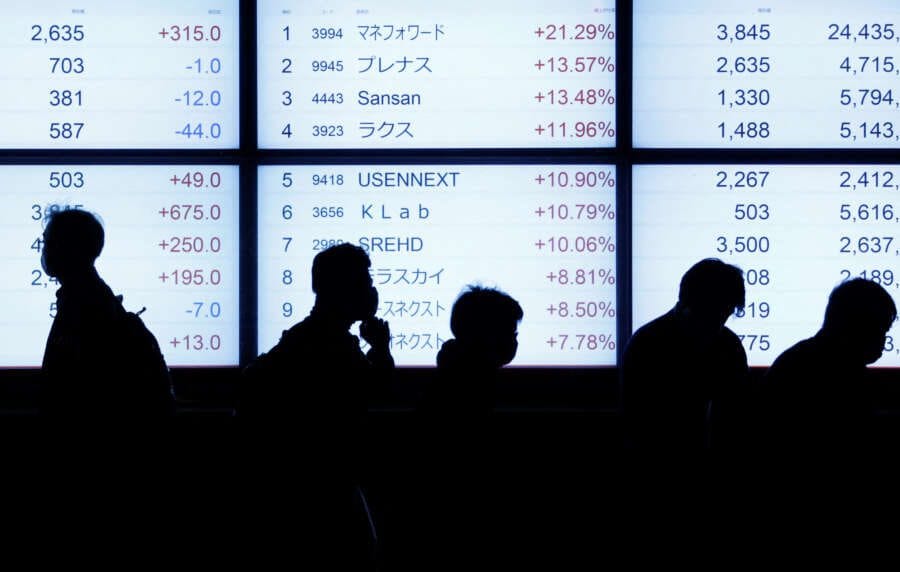
By Tom Westbrook
SINGAPORE (Reuters) – Asian stocks hovered below seven-month highs on Thursday, as investors waited to see whether U.S. data will confirm inflation is in retreat, while the yen rose with a report Japan will next week review the side-effects of its ultra-easy policy.
Following gains for Wall Street indexes overnight, MSCI’s broadest index of Asia-Pacific shares outside Japan climbed to a seven-month high in morning trade, before easing back to flat by lunchtime in Hong Kong.
Japan’s Nikkei was steady, as were S&P 500 futures. European futures rose 0.4%. Bonds held overnight gains and the U.S. dollar was pinned near a seven-month low at $1.0769 per euro.
Due at 1330 GMT, economists expect the rise in core U.S. consumer prices slowed to an annual pace of 5.7% in December, from 6% a month earlier. Month-on-month headline inflation is seen at zero.
The hope is that falling inflation reduces the need for interest rate hikes, and markets have priced better-than-even odds that the Federal Reserve slows its cracking pace and hikes by 25 basis points, rather than 50, at next month’s meeting.
“(It) is the CPI number that could help settle the debate for the February meeting,” said NatWest Markets’ U.S. rates strategist Jan Nevruzi.
“We expect a below consensus CPI print, which if it materialises, could push this rally even further.”
Boston Federal Reserve bank leader Susan Collins also helped things, remarking to the New York Times that she was leaning towards a 25 basis point hike.
Optimism for a more benign rates outlook and a pickup in demand as China emerges from strict COVID restrictions also drove oil prices sharply higher to one-week peaks. [O/R]
Brent crude futures topped $83 on Thursday. U.S. Treasuries added a little to overnight gains, with benchmark 10-year yields down 3.7 bps to 3.5189% and 30-year yields down 4.4 bps to 3.6375%.
European rate expectations also pulled back a little.
CHINA HOPES
Along with hopes for gentler central banks in the West, investors are also banking on a recovery in China to help global growth and are eyeing a potential policy shift in Japan.
The Bank of Japan stunned markets last month by widening the band around its 10-year bond yield target, a move that triggered a sudden rise in yields and a jump in the yen.
On Thursday Japan’s Yomiuri newspaper reported the BOJ will review of the side-effects of Japan’s ultra-easy settings sooner than expected at next week’s policy meetings, and that it may take additional steps to correct distortions in the yield curve.
This likely refers to the fact that 10-year yields have been stuck at the new ceiling of 0.5% for four sessions, even while the BOJ has been busy buying bonds in bulk to get them down.
The yen rose about 0.8% in otherwise quiet currency trade to 131.47 per dollar. Ten-year Japanese government bond futures fell to almost eight-year lows.
Foreign exchange markets were elsewhere holding their breath ahead of CPI data while China’s reopening kept a bid under Asia’s currencies. The yuan traded near five-month highs at 6.7564 per dollar. The Aussie held above $0.69.
China on Thursday reported consumer price falls in December and a larger-than-expected drop in factory gate prices – underscoring the weakness in demand that investors are betting will recover over the coming months.
“It’s not enough for China to come out of COVID to really turn the whole world economy around,” said Steven Wieting, chief investment strategist and chief economist at Citi Global Wealth Investments. “But it really weighs in the opposite direction.”
Inflation data is also due in India later on Thursday, where hopes are it will steady below 6%.
(This story has been refiled to add a dropped word in the first paragraph)
(Editing by Lincoln Feast)


